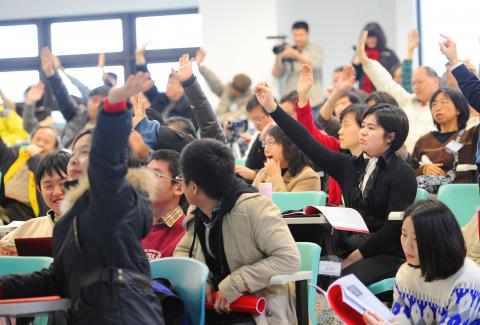A trade union comprised of faculty and staff from the nation’s institutes of higher education was officially established yesterday, calling for better labor conditions, democratic governance of universities, and academic freedom and fairness in distributing the nation’s educational resources.
According to Taiwan Higher Education Union statistics, there are at least 60,000 full-time and part-time professors, 30,000 staff and 120,000 research assistants and part-time workers in the country’s higher education institutes.
However, the number of contract or part-time faculty and staff is rapidly increasing, causing labor conditions to worsen in the past few years, it said.

Photo: Lo Pei-der, Taipei Times
There were 41,822 full-time and 27,111 part-time university faculty in 2001, but last year there were 49,929 full-time and 44,215 part-time university faculty, a 63 percent -increase in the number of part-time faculty, the union said.
At the establishment meeting held on National Taiwan University campus yesterday, Taiwan Higher Education Union preparatory committee convener Tai Po-fen (戴伯芬), a professor in the Department of Sociology at Fu Jan Catholic University, said the trade union was established because of an increasing number of cases of unreasonable dismissal of faculty, unreasonable pressure to produce research papers published in the Social Sciences Citation Index’s (SSCI) journals and other institutional problems.
“The main origin of these problems is the Ministry of Education,” National Chung Cheng University associate professor of politics Chen Shang-chih (陳尚志) said, adding that one major problem was the unbalanced distribution of higher education resources, with the higher-ranking schools getting most of the educational budget and research projects.
According to National Chung Cheng University Department of Mass Media associate professor and Taiwan Media Watch chairman Kuan Chung-hsiang (管中祥), a critical problem is the over-rigid accreditation system for departments and faculty, causing many professors to aim only at a few certain goals that the accreditation system rates, such as publishing papers in SSCI-listed journals.
Kuan said a large part of the accreditation system focused on research results and other aspects such as teaching.
“Some people say it’s ivory tower research, but with the rigid accreditation standards, it’s like forcing the faculty to do research in a small room up in the ivory tower,” Kuan said.

CHANGING LANDSCAPE: Many of the part-time programs for educators were no longer needed, as many teachers obtain a graduate degree before joining the workforce, experts said Taiwanese universities this year canceled 86 programs, Ministry of Education data showed, with educators attributing the closures to the nation’s low birthrate as well as shifting trends. Fifty-three of the shuttered programs were part-time postgraduate degree programs, about 62 percent of the total, the most in the past five years, the data showed. National Taiwan Normal University (NTNU) discontinued the most part-time master’s programs, at 16: chemistry, life science, earth science, physics, fine arts, music, special education, health promotion and health education, educational psychology and counseling, education, design, Chinese as a second language, library and information sciences, mechatronics engineering, history, physical education

DEADLOCK: As the commission is unable to forum a quorum to review license renewal applications, the channel operators are not at fault and can air past their license date The National Communications Commission (NCC) yesterday said that the Public Television Service (PTS) and 36 other television and radio broadcasters could continue airing, despite the commission’s inability to meet a quorum to review their license renewal applications. The licenses of PTS and the other channels are set to expire between this month and June. The National Communications Commission Organization Act (國家通訊傳播委員會組織法) stipulates that the commission must meet the mandated quorum of four to hold a valid meeting. The seven-member commission currently has only three commissioners. “We have informed the channel operators of the progress we have made in reviewing their license renewal applications, and

The High Prosecutors’ Office yesterday withdrew an appeal against the acquittal of a former bank manager 22 years after his death, marking Taiwan’s first instance of prosecutors rendering posthumous justice to a wrongfully convicted defendant. Chu Ching-en (諸慶恩) — formerly a manager at the Taipei branch of BNP Paribas — was in 1999 accused by Weng Mao-chung (翁茂鍾), then-president of Chia Her Industrial Co, of forging a request for a fixed deposit of US$10 million by I-Hwa Industrial Co, a subsidiary of Chia Her, which was used as collateral. Chu was ruled not guilty in the first trial, but was found guilty

Taiwan People’s Party (TPP) Chairman Huang Kuo-chang (黃國昌) yesterday appealed to the authorities to release former Taipei mayor Ko Wen-je (柯文哲) from pretrial detention amid conflicting reports about his health. The TPP at a news conference on Thursday said that Ko should be released to a hospital for treatment, adding that he has blood in his urine and had spells of pain and nausea followed by vomiting over the past three months. Hsieh Yen-yau (謝炎堯), a retired professor of internal medicine and Ko’s former teacher, said that Ko’s symptoms aligned with gallstones, kidney inflammation and potentially dangerous heart conditions. Ko, charged with